"Wayside" Wows Theater Festival Audiences in Segovia and Shanghai
"The Wayside Café," the Ateneo Fine Arts production of Tony Perez’s play, won heaps of acclaim in two recent international festivals --the first in the 2017 Asia-Pacific Bond of Theater Schools (APB) Festival held from June 13-19 at the Shanghai Theater Academy in Shanghai, China; the second, held in Segovia, Spain from July 13-23, at the Inaugural Student Theater Festival of the International Theater Institute (ITI)-UNESCO’S Network of Higher Education in the Performing Arts. The Ateneo de Manila is a member of these federations.
“It was fabulous,” exclaimed Emilya Cachapero, ITI Vice-President, who also said that “the production did the Philippines proud. “Mesmerizing,” seconded Sibhadip Rana, a theater professor from India, “we were glued to the play from the first moment.” Daniel Bausch, the ITI festival co-director from Switzerland simply placed his hand on his chest and whispered, “I was moved. Great work.” Theater director B. Khisigzaya from the Mongolian State University of Arts and Culture confessed that “the play touched me deeply.”And Steven Fernandez, Artistic Director of the MSU-IIT Integrated Performing Arts Guild, who joined his team in the Shanghai Festival, wrote in the Inquirer (1 July 2017) that the play was a “poignant portrayal” that “slammed us with the reality of life-death transition.”
Most of the reactions to the production were unanimous in this respect: The Wayside Café touched their hearts, provoked reflection, and evoked a sense of sadness and hope. These reactions came from delegates spanning about 70 countries – from Australia to South Africa, Japan to Turkey, Bangladesh to France, India to the United Kingdom, Sri Lanka to Spain, Brazil and Slovenia. Tony Perez’s play, written in 1982 for the Legion of Mary, set in a purgatorial limbo, centering on two teachers -- the older one guiding the younger one to free himself from past cherished memories and to accept his place in the afterlife -- continues to tug emotional roots, this time with a diverse intercontinental audience.
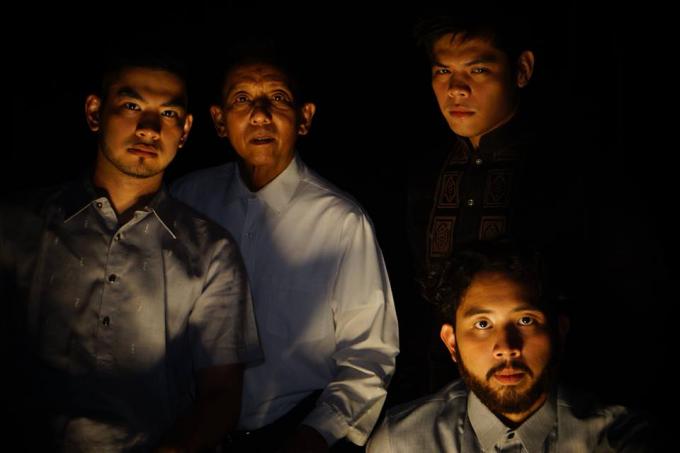
What made it work? For one, the movement motif. The Wayside Café is basically a conversation between two people and can be staged in a straightforward manner. This time around, however, director Ricky Abad casted two Ateneo actors with excellent physical theater training skills to use a dance form called “contact improvisation” as the gestural motif with the text serving as the “music.” The “experiment,” observed Christine Vohlmag, the Berlin-based ITI Director for Training, was “innovative.” As a result, the audience was listening to the lines while simultaneously interpreting their own understanding of the text through the abstract forms created by the movement.
Audience engagement also involved their own physical action. Before entering the theater, audience members were asked to write a vivid memory on a post-it. As they enter the theater, the audience saw an actor placing the post-its on the back wall of the set. Thus, the audience’s memories become linked to the personal memories that the actors would reveal in the play. Towards the end of the play, industrial fans placed on the wings of the stage blow the post-its away, a visual metaphor of the need to purge oneself to achieve enlightenment in the afterlife. Audiences see their own memories scatter like confetti; as they do so, the point of the play strikes home with a sense of pain and loss.
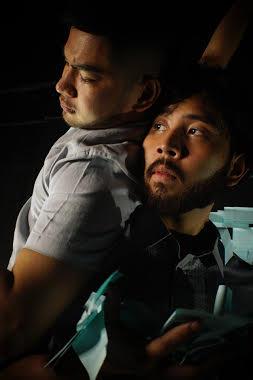
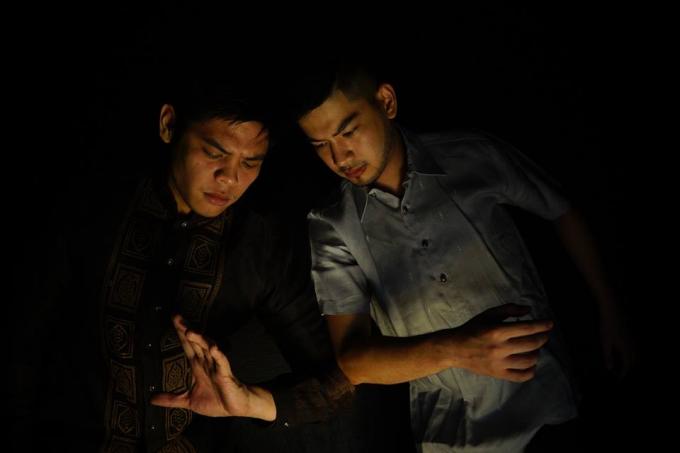
India’s Sibhatip Rana notes this visual release of memory as a surreal moment in the production, a moment that blended effortlessly with the realistic and the stylistic aspects of the play, and giving the production an “organic coherence.” Derek Goldman, the festival director from Georgetown University, makes a similar point, observing the “elegant structure” of the production with the realistic elements giving the play a rigid institutional frame while the non-realistic elements demonstrating the “life within” this solid structure. Moreover, as many observed, the actors shifted from one level of acting to another without skipping a beat, giving the performance a seamless flow.
Ateneo actors Nicolo Magno and Brian Sy played the teachers and choreographed their own movement sequences. Ricky Abad played the role of the Waiter, and tenor Arman Ferrer, last seen on the Ateneo stage in the sarswela Walang Sugat, took the role of the Singer. Ferrer’s tender renditions of the Ave Maria – the Bach-Gounod version at the start and the Francisco Santiago version at the end – gave the production a spiritual, transcendental quality. Tanghalang Ateneo stalwarts – Reamur David who created the Sound Design, Daniel Cortezano who did Technical Direction and Lights Design, and Rina Reinoso who served as Stage Manager – rounded up the festival team.
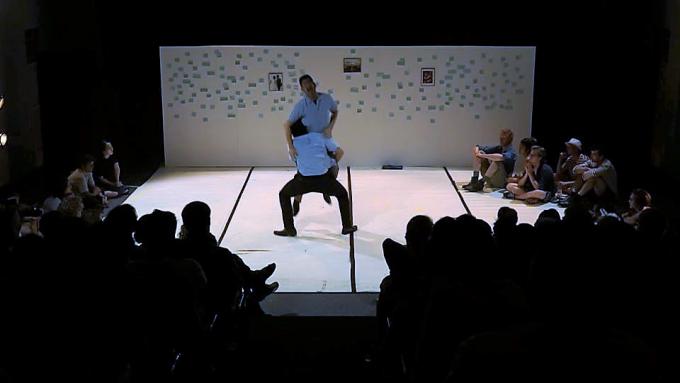
Team members also attended several workshops and listened to a number of presentations in the course of both the theater festival and the 35th ITI World Congress that followed. They also were active participants in a culminating presentation together with student delegates from other ITI member countries. Rehearsing for five straight days, six groups of students, each one coming from mix of countries, performed a series of devised presentations based on the concept of “home” and set these pieces in a space that was formerly a women’s prison. The show, performed twiceduring the Congress, was a marvel of physical expressiveness, insight, daring, and originality. It was a major highlight of both the festival and the Congress – and a glimpse of what the theater of the future may be.
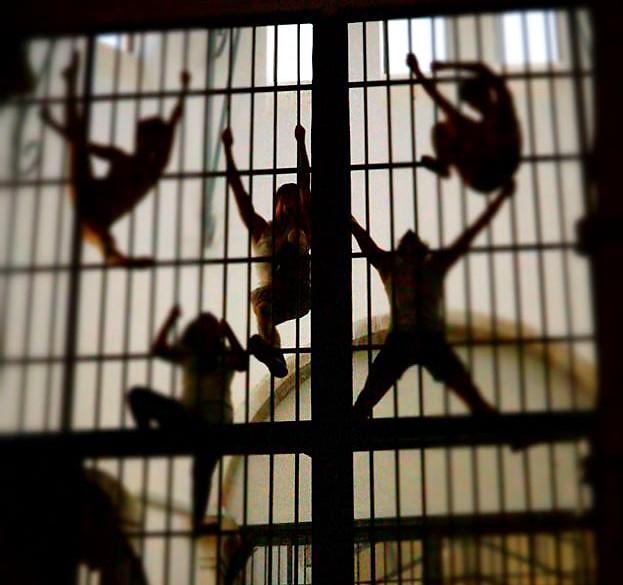
The Asia-Pacific Bond of Theater Schools will move to Yogyakarta, Indonesia in September 2018, while the ITI Student Theater Festival meets in Da Nang, Vietnam in July-August 2018. The Loyola Schools, Ateneo de Manila University, is a member of these two federations. Meanwhile, India’s National School of Drama has sent invitations to schools to participate in a Theater Olympics that will feature over 500 productions to be shown in Delhi and three major Indian cities. The bars of performance have been raised in these 2017 festivals. Ateneo Fine Arts hopes to clear and top these bars in 2018.
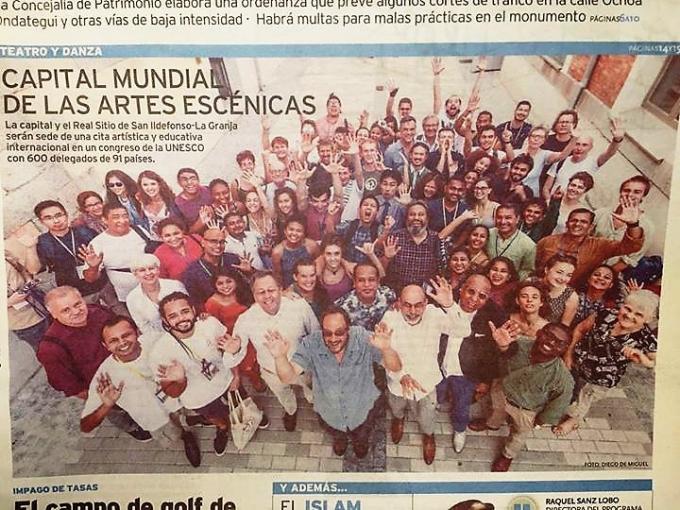
Ateneo participation in both Segovia and Shanghai festivals received encouraging support from the Office of the Vice-President, Loyola Schools; the Office of Research and Creative Work, Loyola Schools; the University Research Council; the Office of University and Global Relations; and the School of Humanities, Loyola Schools.
In both Segovia and Shanghai, a long silence pervaded the theater when the lights faded out to end the play. It was a moment to recover from what Shamman Moishan from Bangladesh referred to as “the poetics of suffering” that transpired on stage. Only when the lights turned on to reveal the actors standing for curtain call did the applause and hoots resounded from the audience. A long applause. And in Segovia, the actors entered the stage three times to take a bow, an accolade given only to a select number of festival shows. “Amazing,” was how Hope Kaahwa from Uganda felt about the show.
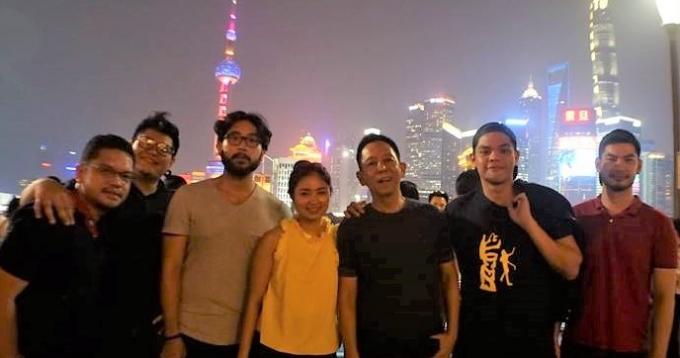
Dr. Ricky Abad with the Shanghai team
Plans are afoot to show The Wayside Café at the Areté when it opens late this year.
Photos courtesy of Reamur David, Daniel Cortezano, and the ITI Spanish Center
